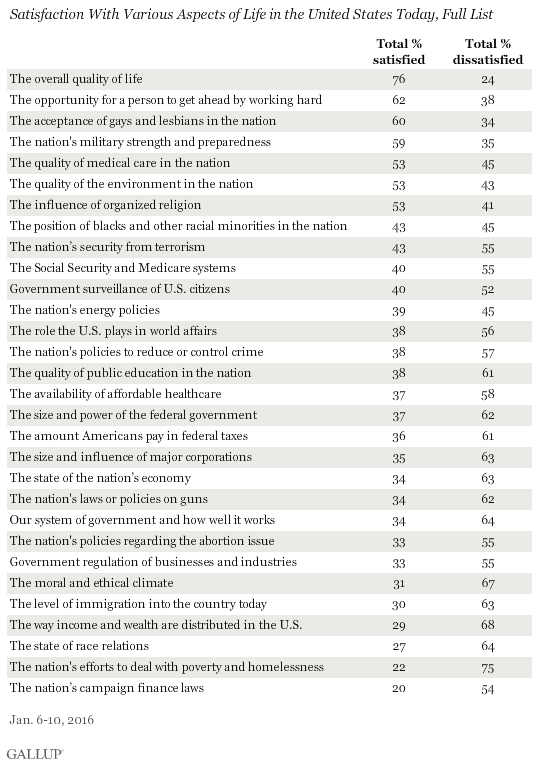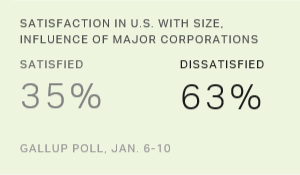Story Highlights
- More than six in 10 dissatisfied with size, influence
- 55% of Americans dissatisfied with government regulation
- Slightly more want regulation decreased rather than increased
WASHINGTON, D.C. -- A majority of U.S. adults, 63%, say they are dissatisfied with the size and influence of major corporations, while 35% are satisfied. This is largely consistent with what Gallup has found over the past decade, but Americans were more divided between 2001 and 2003.
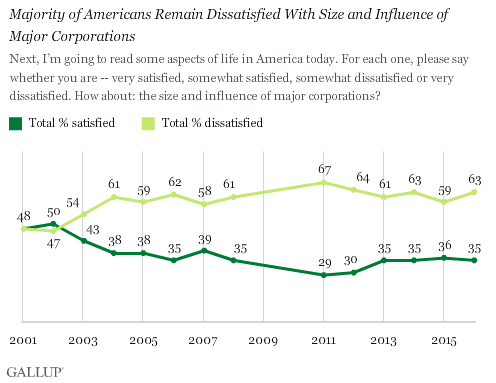
In 2001, the first year Gallup asked Americans this question, a combined 48% said they were either very or somewhat satisfied with the size and influence of major corporations, and the same percentage were very or somewhat dissatisfied. Since 2003, a majority of Americans have been dissatisfied. Dissatisfaction peaked at 67% in 2011, in the first update after the financial crisis. The percentage satisfied, on the other hand, peaked at 50% in 2002.
Gallup then asks Americans who say they are dissatisfied with the size and influence of corporations if they want corporations to have more influence, less influence or about the same level of influence. The vast majority of those dissatisfied with the influence of major corporations want them to have less power than they do. Overall, 49% of U.S. adults are dissatisfied and want corporations to have less influence, 4% are dissatisfied and want them to have more influence and 10% say they are dissatisfied but don't express a preference for change.
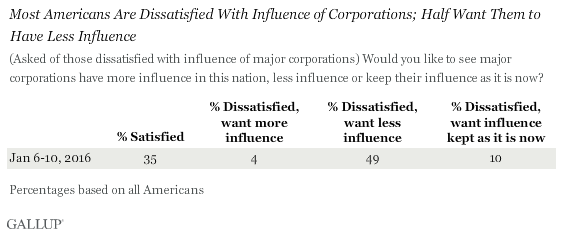
The questions about corporate influence are part of a larger set of questions Gallup asks Americans each January in its annual Mood of the Nation survey. These questions range from satisfaction with the way gays and lesbians are treated in the U.S. to satisfaction with security from terrorism. There is a full list of these items, ranked by Americans' satisfaction with them from most to least, at the end of this article. Satisfaction with the size and influence of corporations ranks in the bottom half of the list but is not at the absolute bottom.
Most Americans Dissatisfied With Government Regulation of Businesses and Industries
For the first time, in 2016 Gallup asked Americans about their satisfaction with government regulation of businesses and industries. About one in three U.S. adults, 32%, say they are satisfied with such government regulation, while 55% are dissatisfied.
Americans who say they are dissatisfied were asked a follow-up question: "Would you like to see government regulation of businesses and industries increased, decreased or remain about the same?" These Americans' responses are divided. Twenty percent of U.S. adults are dissatisfied with the regulation and believe it should be increased, while 25% are dissatisfied and say the regulation should be decreased. One in 10 Americans are dissatisfied with the regulation, but feel it should remain about the same.
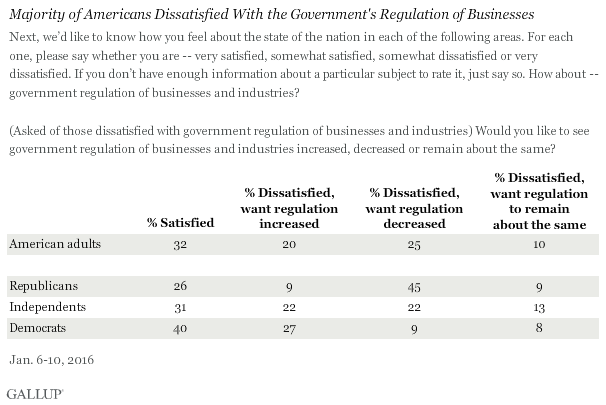
Democrats (40%) are more likely than Republicans (26%) and independents (32%) to be satisfied with government regulation of businesses and industries. More Democrats are dissatisfied and want regulation increased (27%) than are dissatisfied and want regulation decreased (9%).
Republicans are almost exactly the opposite. Nearly half of Republicans, 45%, say they are dissatisfied and want regulation decreased, and 9% are dissatisfied and want regulation increased. Independents are evenly split -- with 22% saying they are dissatisfied and want regulation increased, and 22% saying they are dissatisfied and want regulation decreased.
Bottom Line
Americans have long been suspicious of the power of big corporations, but they have not been supportive of increasing regulation of businesses, particularly during the Obama administration. That may partly reflect new regulations that President Barack Obama has proposed or enacted, most notably regarding energy, including the coal industry. Democratic presidential candidates Hillary Clinton and Bernie Sanders have also advocated for new regulations, especially on Wall Street. This may not be supported by the quarter of Americans who want regulation decreased, or the third who are satisfied with current level of regulation.
But those preferences may be influenced as much by who is in the White House and what policies he or she is pursuing. During the George W. Bush administration, Americans were much less likely to say they thought government regulated business too much. And most of the current GOP presidential candidates advocate reduced regulation of businesses and corporations. As a result, Americans' satisfaction with business regulation and their preferences for more or less of it could shift, depending on the party of the president who is elected next November.
Historical data are available in Gallup Analytics.
Survey Methods
Results for this Gallup poll are based on telephone interviews conducted Jan. 6-10, 2016, with a random sample of 1,012 adults, aged 18 and older, living in all 50 U.S. states and the District of Columbia. For results based on the total sample of national adults, the margin of sampling error is ±4 percentage points at the 95% confidence level. All reported margins of sampling error include computed design effects for weighting.
Each sample of national adults includes a minimum quota of 60% cellphone respondents and 40% landline respondents, with additional minimum quotas by time zone within region. Landline and cellular telephone numbers are selected using random-digit-dial methods.
View survey methodology, complete question responses and trends.
Learn more about how Gallup Poll Social Series works.
